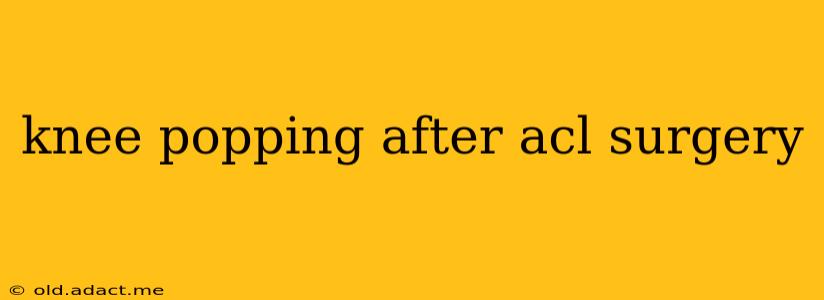Experiencing a popping sound in your knee after ACL surgery is understandably concerning. While some popping is normal after such a significant procedure, understanding the potential causes and when to seek medical attention is crucial for a successful recovery. This comprehensive guide will address common concerns and provide insights into this post-operative phenomenon.
What Causes Knee Popping After ACL Surgery?
Several factors can contribute to a popping sensation in the knee following ACL reconstruction. These include:
-
Scar Tissue Formation: During the healing process, your body creates scar tissue around the surgical site. This tissue can sometimes move or rub against other structures within the knee joint, producing a popping sound. This is often a benign occurrence.
-
Meniscus Tears: Although ACL surgery focuses on the anterior cruciate ligament, pre-existing or newly developed meniscus tears can cause popping. The meniscus is cartilage that cushions the knee joint, and tears can create loose fragments that can move and pop.
-
Patellar Tracking Issues: The patella (kneecap) glides along a groove in the femur (thigh bone). Improper tracking of the patella, either pre-existing or aggravated by surgery, can lead to popping.
-
Loose Bodies: Small pieces of cartilage or bone can break loose during surgery or due to pre-existing conditions. These loose bodies can move within the joint, creating popping sensations.
-
Articular Cartilage Damage: Damage to the articular cartilage, the smooth tissue covering the ends of the bones, can contribute to popping. This can be a pre-existing condition or develop as a result of the surgery (though less common).
-
Normal Joint Sounds: In some cases, the popping sound may be related to the normal mechanics of the knee joint, unrelated to the surgery itself. These sounds are often subtle and do not usually cause pain or instability.
Is Knee Popping After ACL Surgery Always a Sign of a Problem?
Not necessarily. Mild popping without accompanying pain, swelling, or instability is often benign and part of the normal healing process. However, significant popping accompanied by other symptoms warrants immediate attention.
When Should I See a Doctor About My Popping Knee After ACL Surgery?
It's essential to contact your surgeon or physical therapist immediately if you experience:
- Increased Pain: A sudden or significant increase in knee pain.
- Swelling: New or worsening swelling around the knee joint.
- Instability: Feeling like your knee is giving way or unstable.
- Locking: Inability to fully bend or straighten your knee.
- Severe Popping: Loud or frequent popping sounds accompanied by pain or discomfort.
What Happens During a Follow-Up Appointment for Knee Popping?
Your doctor will likely conduct a physical examination, assessing your range of motion, stability, and pain levels. Imaging tests, such as X-rays or an MRI, might be ordered to rule out more serious issues, such as meniscus tears or loose bodies.
How Can I Manage Knee Popping After ACL Surgery?
While some popping is normal, adhering to your prescribed physical therapy program is essential. This helps to strengthen the muscles supporting the knee, improving stability and reducing the likelihood of popping due to muscular imbalances. Your physical therapist can provide specific exercises to address potential patellar tracking issues.
Can Physical Therapy Help with Knee Popping After ACL Surgery?
Yes, physical therapy plays a crucial role in managing post-operative knee popping. A tailored program can address underlying issues, strengthen supporting muscles, and improve overall knee function.
Is it Normal for my Knee to Pop and Click After ACL Reconstruction?
Some degree of popping and clicking can be considered normal during the healing process, particularly in the early stages. However, the intensity and frequency of these sounds, along with any associated pain or instability, should guide your decision on seeking medical attention. Always err on the side of caution and consult your doctor if you have any concerns.
Disclaimer: This information is for general knowledge and does not constitute medical advice. Always consult with a qualified healthcare professional for diagnosis and treatment of any medical condition.
